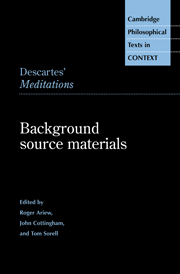Book contents
- Frontmatter
- Contents
- Preface
- Abbreviations
- General Introduction
- 1 Dialectic
- 2 That Nothing Is Known
- 3 The Promotion of Mathematics
- 4 Metaphysical Disputations
- 5 Wisdom
- 6 A Compendium of Philosophy in Four Parts
- 7 Corpus of Philosophy
- 8 The Use of Reason, The Impiety of the Deists, and The Truth of the Sciences
- 9 Unorthodox Essays against the Aristotelians
- 10 The Two Truths and The Immortality of the Soul
- 11 Dialogue on the Diversity of Religions and Little Skeptical Treatise
- 12 Universal Science
- 13 That God Exists
- Appendix: Condemnations of Cartesianism
- Bibliography
- Index
Appendix: Condemnations of Cartesianism
Published online by Cambridge University Press: 05 June 2012
- Frontmatter
- Contents
- Preface
- Abbreviations
- General Introduction
- 1 Dialectic
- 2 That Nothing Is Known
- 3 The Promotion of Mathematics
- 4 Metaphysical Disputations
- 5 Wisdom
- 6 A Compendium of Philosophy in Four Parts
- 7 Corpus of Philosophy
- 8 The Use of Reason, The Impiety of the Deists, and The Truth of the Sciences
- 9 Unorthodox Essays against the Aristotelians
- 10 The Two Truths and The Immortality of the Soul
- 11 Dialogue on the Diversity of Religions and Little Skeptical Treatise
- 12 Universal Science
- 13 That God Exists
- Appendix: Condemnations of Cartesianism
- Bibliography
- Index
Summary
Descartes made converts to his new philosophy with the publication of the Principles, the systematic exposition of his thought, set out in Scholastic style, but, on the whole, he did not succeed in getting the work adopted in the curriculum of the schools. Here and there one can find Cartesian principles taught, as with the ill-fated Oratorians at Angers in the 1670s and Edmond Pourchot at Paris in the 1690s. One can also find Cartesian propositions included in some disputations, but the discussion is mostly negative. The official response to Descartes' philosophy was unfavorable for most of the seventeenth century. At various times, Descartes waged fierce battles with his opponents. In the 1640s, he thought himself “at war” with the Jesuits, a war precipitated by a Jesuit disputation at Clermont College and continuing through Pierre Bourdin's Seventh Set of Objections, published, together with Descartes' Replies and the Letter to Dinet, in the second edition of the Meditations (1642). There were troubles and official condemnations by Protestants at Utrecht, circa 1642, and Leyden, 1647. The battles continued and intensified after Descartes' death in 1650. There were condemnations by Catholics at Louvain in 1662, culminating with Descartes' works being put on the Index of Prohibited Books by the censors of Rome in 1663. The fighting raged in the second half of the seventeenth century: the Jesuits held more anti-Cartesian disputations at Clermont College in 1665, some clearly intended to make Descartes look ridiculous.
- Type
- Chapter
- Information
- Descartes' MeditationsBackground Source Materials, pp. 252 - 260Publisher: Cambridge University PressPrint publication year: 1998



